paradise lost失乐园
- 格式:ppt
- 大小:37.94 MB
- 文档页数:44
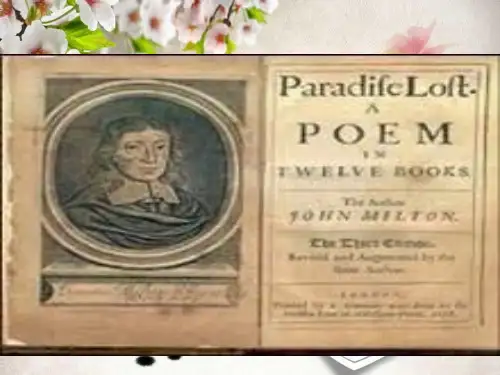
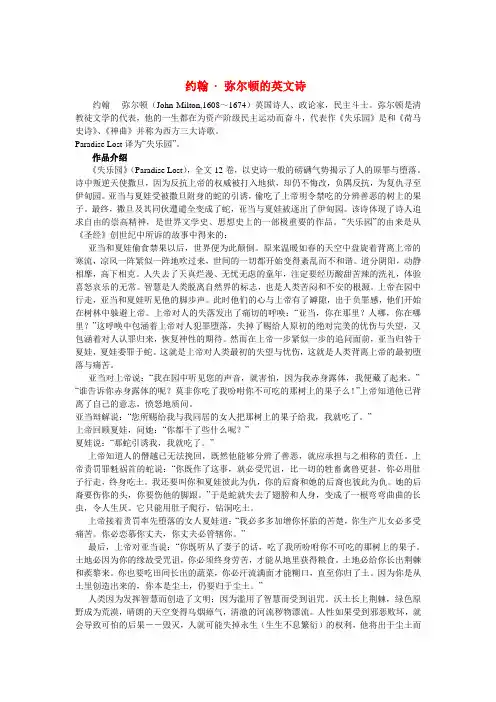
约翰·弥尔顿的英文诗约翰·弥尔顿(John Milton,1608~1674)英国诗人、政论家,民主斗士。
弥尔顿是清教徒文学的代表,他的一生都在为资产阶级民主运动而奋斗,代表作《失乐园》是和《荷马史诗》、《神曲》并称为西方三大诗歌。
Paradise Lost译为“失乐园”。
作品介绍《失乐园》(Paradise Lost),全文12卷,以史诗一般的磅礴气势揭示了人的原罪与堕落。
诗中叛逆天使撒旦,因为反抗上帝的权威被打入地狱,却仍不悔改,负隅反抗,为复仇寻至伊甸园。
亚当与夏娃受被撒旦附身的蛇的引诱,偷吃了上帝明令禁吃的分辨善恶的树上的果子。
最终,撒旦及其同伙遭谴全变成了蛇,亚当与夏娃被逐出了伊甸园。
该诗体现了诗人追求自由的崇高精神,是世界文学史、思想史上的一部极重要的作品。
“失乐园”的由来是从《圣经》创世纪中所诉的故事中得来的:亚当和夏娃偷食禁果以后,世界便为此颠倒。
原来温暖如春的天空中盘旋着背离上帝的寒流,凉风一阵紧似一阵地吹过来,世间的一切都开始变得紊乱而不和谐。
道分阴阳,动静相摩,高下相克。
人失去了天真烂漫、无忧无虑的童年,注定要经历酸甜苦辣的洗礼,体验喜怒哀乐的无常。
智慧是人类脱离自然界的标志,也是人类苦闷和不安的根源。
上帝在园中行走,亚当和夏娃听见他的脚步声。
此时他们的心与上帝有了罅隙,出于负罪感,他们开始在树林中躲避上帝。
上帝对人的失落发出了痛切的呼唤:“亚当,你在那里?人哪,你在哪里?”这呼唤中包涵着上帝对人犯罪堕落,失掉了赐给人原初的绝对完美的忧伤与失望,又包涵着对人认罪归来,恢复神性的期待。
然而在上帝一步紧似一步的追问面前,亚当归咎于夏娃,夏娃委罪于蛇。
这就是上帝对人类最初的失望与忧伤,这就是人类背离上帝的最初堕落与痛苦。
亚当对上帝说:“我在园中听见您的声音,就害怕,因为我赤身露体,我便藏了起来。
”“谁告诉你赤身露体的呢?莫非你吃了我吩咐你不可吃的那树上的果子么!”上帝知道他已背离了自己的意志,愤怒地质问。

1.人类最初违反天神命令而偷尝禁果,2.把死亡和其他各种各样的灾难带到人间,3.于是失去了伊甸乐园,4.直到出现了一个更伟大的人,5.才为我们恢复了这乐土。
6.天庭的诗神缪斯呀!7.您当年曾点化过那个牧羊人,8.您在那神秘的何烈山头,或西奈的峰巅,9.最初向您的选民宣讲太初天和地怎样从混沌中生出;10.那郇山似乎更加蒙受您的喜悦,11.在神殿近旁弄流的是西罗亚溪水;12.因此我向那儿祈求你给我力量,13.完成这篇大胆冒险的诗歌,追踪一段事迹——14.从未有人尝试缀锦成文,15.吟咏成诗的题材,遐想凌云,16.飞越爱奥尼的高峰。
17.圣灵呀!特别请您,18.您喜爱廉洁和公正的心胸,19.胜过所有的神殿。
20.您无所不知,因此请您教导我;21.混沌之初,您便存在,22.张开巨大的翅膀,像鸽子一样孵伏那洪荒,23.使它怀孕,愿您的光明驱除我心中的蒙昧,24.举起并且支撑我的低微;25.使我能够适应这个伟大主题的崇高境界,26.使我能够阐明恒久的公义,27.向世人昭示天道的公正。
28.天界和地狱深渊,请先说,29.因为在您的眼中,一切都了如指掌;30.为什么我们的始祖,31.在那样的乐土,那样得天独厚,32.除了那惟一的禁令以外,33.他们俩本是世界的主宰,请先讲;34.他们竟背叛而自绝于他们的创造主?35.究竟何人引诱他们犯下这不幸的滔天大罪呢?36.原来是地狱的蛇;37.是嫉妒和仇恨激起他的奸智,38.使他欺骗了人类的母亲。
39.是他的高傲,致使他和他的全部天军被逐出天界,40.造反天军的援助,使他觉得自己无比荣耀,41.他相信:如果他反叛,就能和上帝分庭抗礼;42.由此野心勃勃,觊觎神的宝座和主权,43.枉费心机地在天界掀起了忓逆的战争。
44.全能的神栽葱般,45.把浑身火焰的他从净火天上摔下去,46.这个敢于向全能全力者挑战的神魔迅速坠下,47.一直落到深不可测的地狱,48.被禁锢在金刚不坏的镣铐和永远燃烧的刑火中。
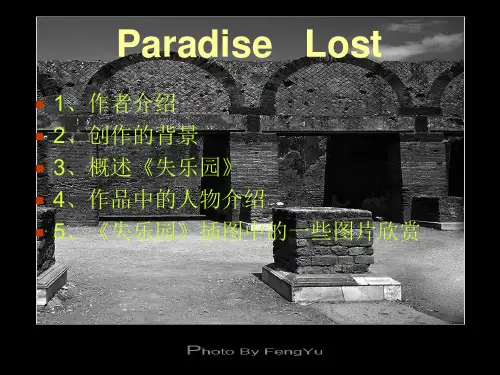
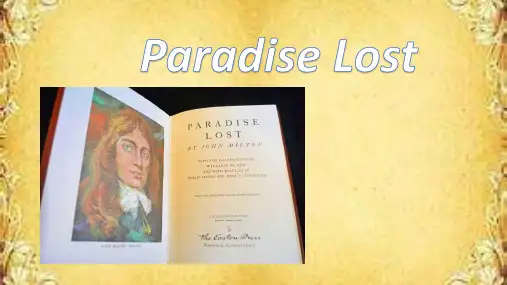
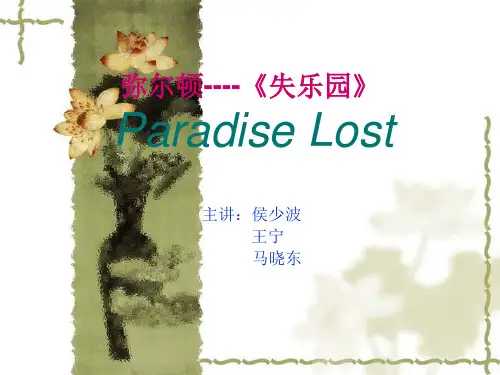

paradise-lost失乐园赏析课件Paradise LostType of WorkParadise Lost is an epic poem which — like the epic poems of Homer, Dante, Vergil, and Goethe—tells a story about momentous events while incorporating grand themes that are timeless and universal.Date CompletedMilton completed the first version of Paradise Lost in 1667. It consisted of 10 books. In 1668 and 1669, he added an introductory comment about the verse form and a special section with summaries of each book. In 1674, he published the final version of the epic, in which he divided Books 7 and 10 into two books each. The completed work thus had 12 books instead of 10. He also placed each summary at the beginning of the book it summarized.SourcesMilton used the Bible, Homer's Iliad and Odyssey, Vergil's Aeneid, and the stories in Greco-Roman mythology as sources of information and as writing models. The Bible's Book of Genesis is the main source for his retelling of the story of creation and the first humans, Adam and Eve.SettingsThe settings are heaven, hell, the firmament (苍穹) (Chaos), and earth.CharactersGod the Father, God the Son: (trinity)Two of the three divine persons making up the all-powerful Godhead, the single deity(神性)that created and ruled all that exists outside of itself. The third divine person, the Holy Spirit, does not play a role in Paradise Lost. God the Father is portrayed as just but merciful, condemning (批判) the defiant (目中无人)and unrepentant (不后悔的) rebel angels but permitting redemption of the repentant Adamand Eve. God the Son volunteers to redeem them by becoming human and enduring suffering and death.Satan (Lucifer, Archfiend): Powerful and prideful angel who, with legions (众多的) of supporters, leads an unsuccessful rebellion against God and suffers eternal damnation. To gain revenge, he devises a plan to corrupt God's newly created beings, Adam and Eve, through deceit. Modern readers often admire him for his steely defiance (藐视). He would rather rule in hell, he says, than serve in heaven. It was not Milton's intent, however, to create an admirable character; rather his intent was to create a character of colossal (巨大的) hatred —loathsome (令人讨厌的), execrable (恶劣的), incurably remorseless(冷酷无情的).Adam and Eve: The first human beings, created by God to fill the void(真空)that resulted when God cast Satan and his supporters out of the celestial realm. Adam and Eve live on the planet earth in utterhappiness in a special garden where spring is the only season and love and godly living prevail. Though they have all that they want and need, cunning Satan tells them they can have knowledge and status beyond their reach if only they eat of the fruit of the Tree of Knowledge. Eve can become a goddess, he says. Vanity overtakes her. She eats. Adam reluctantly does the same.Gabriel, Raphael, Michael, Uriel: Powerful and fearless angels on the side of God. Beelzebub, Mammon, Belial, Moloch: Powerful leaders in Satan's army. In a great council in hell, each of them speaks his mind on what policy devil-kind should follow after losing paradise. Should they make a new war? Should they make peace?Ithuriel, Zephron: Angels who expel Satan from the Garden of Eden with the help of a sign from God. Satan returns to the garden later to complete his devious enterprise. Mulciber: Fallen angel who designs hell's capital city and seat of government,Pandemonium. In ancient Roman mythology, Mulciber is another name for Vulcan (Greek: Hephaestus), god of fire and the forge. As a blacksmith, he kept shop in burning mountains (volcanoes).Sin: Daughter of Satan. She was born from his head in the manner of Athena, Greek goddess of wisdom and war, who sprang from the forehead of Zeus, king of the gods. Death: Son of Satan and SinVarious Other Angels and DevilsMilton's Solar SystemIn describing the planets and other celestial bodies, Milton models God’s creation on the Ptolemaic天动说的design (also called the geocentric design) rather than the Copernican design (also called the heliocentric 以太阳为中心的design). The former placed earth at the center of the solar system, with the sun and other celestial bodies orbiting it. Copernicus and other scientists later proved that the earth orbits the sun. Milton was aware of theCopernican theory, but he used the Ptolemaic design—either because he believed it was the more credible theory or because he believed it would better serve his literary purpose. In Paradise Lost, Adam inquires about the movements of celestial bodies—in particular, whether earth orbits the sun or vice versa—in his conversation with the archangel天使Raphael, but Raphael gives no definite answer. Raphael may have been speaking for Milton. Style and Verse FormatMilton wrote Paradise Lost in dignified, lofty, melodic English free of any colloquialisms and slangs that would have limited the work's timeliness and universality. The format, Milton says in an introductory note, is "English heroic verse without rhyme"—in other words, blank verse, the same verse form used by Shakespeare in his plays. Milton's strong religious faith infuses the poem with sincerity and moral purpose, but he does not allow his enthusiasm for his subject to overtake controlof his writing. Though Milton frequently uses obscure allusions to mythology and history, as well as occasional difficult words and phrases, his language is never deliberately affected or ostentatious炫耀的. What is more, it does not preach and does not take the reader on circumlocutory迂回的expeditions. Like a symphony composer—mighty Beethoven, for example —Milton is always in control, tempering his creative genius with his technical discipline.With a good dictionary and an annotated有注解的text, a first-time reader of Milton can easily follow and understand the story while developing an appreciation for the exquisite writing.Epic ConventionsIn Paradise Lost, Milton used the classical epic conventions—literary practices, rules, or devices established by Homer that became commonplace in epic poetry. Some of these practices were also used in other genres ofliterature. Among the classical conventions Milton used are the following:(1) The invocation 祈祷of the muse, in which a writer requests divine help in composing his work.(2) Telling a story with which readers or listeners are already familiar; they know the characters, the plot, and the outcome. Most of the great writers of the ancient world—as well as many great writers in later times, including Shakespeare—frequently told stories already known to the public. Thus, in such stories, there were no unexpected plot twists, no surprise endings. If this sounds strange to you, the modern reader and theatergoer, consider that many of the most popular motion pictures today are about stories already known to the public. Examples are The Passion of the Christ, Titanic, The Ten Commandments, Troy, Spartacus, Pearl Harbor, and Gettysburg. (3) Beginning the story in the middle, a literary convention known by its Latin term in media res资源(in the middle of things). Such aconvention allows a writer to begin his story at an exciting part, then flash back to fill the reader in on details leading up to that exciting part.(4) Announcing or introducing a list of characters who play a major role in the story. They may speak at some length about how to resolve a problem (as the followers of Satan do early in Paradise Lost).(5) Conflict in the celestial realm. Divine beings fight and scheme against one another in the epics of Homer and Vergil, and they do so in Paradise Lost on a grand scale, with Satan and his forces opposing God and his forces.(6) Use of dramatic irony. Dramatic irony isa literary device in which a character in a story fails to see or understand what is obvious to the audience or readers. Dramatic irony appears frequently in the plays of the ancient Greeks. For example, in Oedipux Rex, by Sophocles, dramatic irony occurs when Oedipus fails to realize what the audience knows—that he married his own mother. InParadise Lost, dramatic irony occurs when Adam and Eve happily go about daily life in the Garden of Eden unaware that they will succumb to the devil's temptation and suffer the loss of Paradise. Dramatic irony also occurs when Satan and his followers fail to understand that it is impossible ultimately to thwart挫败or circumvent divine will and justice.Plot SummaryAll Hell broke looseBook IV, Paradise Lost.The Invocation of the Museton opens Paradise Lost by asking a muse to inspire his writing. In ancient Greece and Rome, poets had always requested “the muse” to fire them with creative genius when they began long narrative poems, called epics, about godlike heroes and villains. In Greek mythology, there were nine muses, all sisters,who were believed to inspire poets, historians, flutists, dancers, singers, astronomers, philosophers, and other thinkers and artists. If one wanted to write a great poem, play a musical instrument with bravado, or develop a grand scientific or philosophical theory, he would ask for help from a muse.When a writer asked for help, he was said to be “invoking the muse.” The muse of epic poetry was named Calliope [kuh LY uh pe]. However, in Book 7, Milton identifies Urania—the muse of astronomy—as the goddess to whom he addresses his plea for inspiration.In Milton’s time, writers no longer believed in muses, of course. Nevertheless, since they symbolized inspiration, writers continued to invoke them. So it was that when Milton began Paradise Lost, he addressed the muse in the telling of his tale, writing, “I thence invoke thy aid to my adventurous Song.”The StorySatan and his followers rebel against God. But God and his mighty angels defeat the rebels in a terrible war. God casts them into a dark abyss with a lake of fire. There, the defeated legions deplore悲叹their fate and consider their future. In a great council, the many thousands of the fallen assemble in the capital city and seat of government, Pandemonium, where Satan sits on his royal throne, to hear their leaders speak their minds on the course of action they should take. Moloc, a rebel leader who fought fiercely against the forces of the Almighty, calls for renewed war. Belial彼勒advises a do-nothing policy, maintaining that the horror of their hell will abate in time and that their surroundings will brighten. To challenge God would only result in another defeat and more punishment. After Mammon advises peace, Beelzebub—a majestic, imposing figure—notes that God is creating a new creature, man, who will occupy a new world, earth. If they turn this new creature from his ordained course, using forceor trickery, they can enjoy revenge against God, Beelzebub says. His plan is not his own; it is the plan of Satan, his master. The assembly of devils does not respond; they do not know what to say about this proposal. Then the leader of all the accursed, Satan, speaks up. He first bemoans悲叹their environs:Our prison strong, this huge convex of Fire, Outrageous to devour, immures us round Ninefold, and gates of burning Adamant Barred over us prohibit all egress.(Book 2, lines 444-447)But if any of them manages to break free, Satan says, he will encounter a dark void beyond which are unknown regions and unknown dangers. Nevertheless, Satan, as leader, says he will venture forth and "Through all the coasts of dark destruction seek / Deliverance for us all: this enterprise / None shall partake参与with me." His "enterprise," of course is to work his deceptive charms against the new creatures. He willsubvert 破坏God’s plan and give hell a reason to cheer. None in the assemblage spoke against this plan. Instead, all rose with a thunderous noise to give assent:Towards him they bendWith awful reverence prone; and as a God Extol him equal to the highest in Heaven. (Book 2, 477-479)And so the assembly broke up and ventured off into the regions from whence they came: Rocks, caves, lakes, fens, bogs, dens, and shades of death,A universe of death, which God by curse Created evil, for evil only good,Where all life dies, death lives, and nature breeds,Perverse, all monstrous, all prodigious things, Abominable, inutterable, and worse.(Book 2, 621-626)Meanwhile, Satan "with thoughts inflamed of highest design / Puts on swift wings, and toward the Gates of Hell / Explores his solitary flight. . . " (Book 2, lines 630-632). Later,Satan's daughter, Sin, who was born from the archfiend's head, and his son, Death, who was born of Satan's union with Sin, decide to follow and assist their father.In heaven, God the Father and God the Son observe Satan flying in a rage toward earth. Satan will corrupt his new creatures, the Father says, even though they possess the willpower to reject sin. Their penalty will be death. However, because they will not rebel against God but instead succumb to Satan’s temptation, they will be redeemable—if someone takes on the burden of their sin by suffering and dying on their behalf. When the Son offers himself for this task, the Father accepts the offer and approves of his incarnation in the world of man.To reach earth, Satan must fly past Uriel, a member of the highest-ranking order of angels, the Seraphim. Uriel watches over earth from his post at the sun. Disguising himself as one of the cherubim—the second-highest-ranking order of angels—Satan asks Uriel to point outthe planet where man dwells so that he may go there, admire this new creature, and praise his great Maker. Uriel instructs him, and Satan resumes his journey and arrives at earth.The sight of Paradise disheartens him, for it reminds him of all that he lost in his rebellion against God. After struggling with self-recrimination and doubt, Satan regains himself and enters Paradise, taking the shape of a cormorant—a web-footed sea bird—and perching in the Tree of Life (a tree producing fruit which, when eaten, yields everlasting life) to observe the newly created Adam and Eve. They are beautiful, happy creatures who surprise Satan with their ability to speak and think logically.Later, when they are asleep, Satan whispers evil thoughts into Eve’s ear—of “vain hopes” and “inordinate desires.” When the archangel Gabriel learns of Satan’s presence in Eden, he sends two angels to expel him. When they confront him, Satan defiantly scorns them and prepares for a fight. An angelic squadrondescends toward Eden under the command of Gabriel, and a sign appears in the heavens in which God weighs the adversaries in his golden scales. When Gabriel tells Satan to look at the scales, the archfiend sees that they tip in the favor of the celestial forces, and he flees. On a mission from God, the angel Raphael warns Adam and Eve about Satan. So that they understand the nature of their foe, Raphael tells them the story of Satan’s rebellion and the great war in which angels on both sides fought fiercely. It ended in Satan’s expulsion from heaven, Raphael says, after the Son of God intervened on behalf of the celestial forces. A new world with new creatures was then created to fill the void left by the rebels cast into the deep.Adam, a curious creature, asks Raphael about the earth and its place in creation. Raphael explains the universe but warns Adam to temper his desire for knowledge with humility. When Adam expresses his great satisfaction with Eve as a mate, Raphael againcautions him to be careful. Living with and loving a creature such as Eve, with all of her charm and beauty, is wonderful; however, Adam must not let her divert his attention from his responsibilities to God.Satan returns to the Garden of Eden in the form of a snake and tempts Eve to eat fruit of the Tree of Knowledge in defiance of a divine command never to do so. If she and Adam taste the fruit, he says, they will become gods. Eve eats. After Satan leaves, Adam—though reluctant—also eats. And so Adam and Eve fall from grace, and the Son of God pronounces judgment on the transgressing humans.When Satan returns in triumph to hell, the multitude of fiends cheer him but suddenly turn into serpents. Earth becomes a place of changing seasons; the eternal spring is no more. Adam is downcast, wishing for death, and blames Eve for leading them astray. But they reconcile and decide to go on, confessing their wrongdoing and pleading for forgiveness. God decrees that heaven will remain openfor them. But He sends the archangel Michael down to evict them from Paradise. Before Michael leaves, he tells them about events to come in the history of the world and, from a hilltop, shows Adam his progeny—Cain and Abel (and the murder of Cain by Abel) and the descendants who later will form a covenant with God after a great flood.Michael then foretells the advent of a Redeemer, who will die for the sins of humankind—then rise from the grave and leave earth but return later in a second coming. Adam and Eve then walk into their new life. The World was all before them, where to choose Their place of rest, and Providence their guide: They hand in hand with wandering steps and slow,Through Eden took their solitary way.(Book 10, lines 1537-1540)They enter the imperfect world, with all its perils.'ImageryMilton's imagery is at times graceful and elegant, as in this memorable personification in Book 6:Morn,Waked by the circling hours, with rosy hand Unbarred the gates of light. (lines 2-4)At other times, the imagery is imposing and awe-inspiring, as in this description in Book 7 that ends with hyperbole:There LeviathanHugest of living creatures, on the deep Stretched like a promontory sleeps or swims, And seems a moving land, and at his gills Draws in, and at his trunk spouts out a sea. (lines 412-416)In Book 8, Milton describes the commission of the first sin in simple, straightforward language, followed by a succinct personification summing up the terrible effects of the iniquity:[H]er rash hand in evil hourForth reaching to the fruit, she plucked, she eat:Earth felt the wound, and Nature from her seat,Sighing through all her works, gave signs of woeThat all was lost.(line 780-784)Milton also uses personification in Book 4 in this beautiful passage about a quiet night, the starry sky, and the ascendancy of the moon: The wakeful Nightingale;She all night long her amorous descant sung; Silence was pleased: now glow'd the FirmamentWith living Sapphires: Hesperus that led [Hesperus: evening star which the Greeks associated with the brotherThe starry Host, rode brightest, till the Moon of Atlas; later Hesperus was associated with Lucifer's brilliant light.]Rising in clouded Majesty, at length Apparent Queen unveiled her peerless light, And o'er the dark her Silver Mantle threw. (lines 602-609)Enjambment跨行连续Milton uses frequently uses enjambment (also spelled enjambement) in the poem. It is a literary device in which a poet does not complete his sentence or phrase at the end of one line but allows it to carry over to the next line, as in these passages from the poem:Of man's first disobedience, and the fruitOf that forbidden tree, whose mortal taste Brought death into the world. . .(Book 1, lines 1-3).Yet Chains in Hell, not Realms expect: mean while From me returned, as erst thou saidst, from flight,This greeting on thy impious Crest receive. 、(Book 6, lines 186-188)Milton's use of enjambment helps the poem flow from one line to the next.Main ThemeIn Book 1 of Paradise Lost, Milton reveals the central theme of the work: to justify theways of God to man. Justify here means to explain and defend, and ultimately to vindicate 澄清, God’s course of action in dealing with Adam and Eve after they succumbed to the temptation of Satan and ate forbidden fruit..Other ThemesInordinate 过度的pride: It leads to Satan's downfall and his continuing defiance of God. Envy: Arising from Satan's pride, it makes him jealous of God the Son, who is the favorite of God the Father.Revenge: It motivates Satan to corrupt Adam and Eve and thereby subvert God's plans. Vanity: It leads Eve to believe—under the temptation of Satan—that she can become godlike.Deceit: Satan appears in many disguises and tells many lies during his mission to trick Adam and Eve.Infidelity: Adam betrays God by siding with Eve and eating the forbidden fruit.Unbridled 不受约束的pursuit of knowledge:It leads Adam and Eve to seek knowledge beyond their ken, knowledge that will make them godlike.Volition意志: Angels and humans alike possess free will, enabling them to make decisions. Satan freely chooses to rebel against God, and Adam and Eve freely choose to eat forbidden fruit. The consequences of their actions are their own fault, not God's. Milton uses this theme to help support the central theme, "to justify the ways of God to man." Disobedience违抗: All sins are acts of disobedience against God, impairing or cutting off the sinner's relationship with God. Adam and Eve and all of the devils disobey God through their sins.Loyalty: Loyalty to God and his ways are necessary for eternal salvation. Loyalty requires obedience. All of the good angels exhibit loyalty.Repentance悔悟: Even though Adam and Eve have disobeyed God, their repentance makes them eligible for eventual salvation.Hope: At the end of Paradise Lost, Adam and Eve enter the imperfect world with hope; they can yet attain eternal salvation.Redemption赎回: Through the suffering and death of the Son of God, sinful man can reconcile himself with God if he is sincerely sorry for his sins.ClimaxThe climax, or turning point, of Paradise Lost occurs when Adam and Eve succumb to Satan's temptations and eat the forbidden fruit. This act of disobedience results in their downfall and eviction from Paradise.What Is an Angel?An angel is a supernatural being that serves God by praising and adoring Him and by carrying out special missions that assist humans. Angels have the additional task of opposing and punishing devils. Devils are angels cast out of heaven because they rebelled against God. The word angel derives from the Greek word angelos, meaning messenger. Themajor western religions—Christianity, Judaism, and Islam—all accept the existence of angels. The rank of angels from highest to lowest is as follows:1. Seraphim (Seraph)2. Cherubim (Cherub)3. Thrones4. Dominations5. Virtues6. Powers7. Principalities8. Archangels9. AngelsStudy Questions and Essay Topics1. What does Satan mean when he says, “Better to reign in hell, then [than] serve in heav’n” (Book 1, line 263)?2. What does Belial mean when he says, "This horror will grow milde, this darkness light"? (Book 2, line 220).3. Explain the allusion in the underlined words:"[H]is Altar breathes / Ambrosial Odours and Ambrosial Flowers" (Mammon, Book 2, lines 243-244)4. Write an essay that reviews Milton's use of epic conventions in Paradise Lost. Be sure to give plenty of examples to support your thesis.5. Write an essay explaining the difference between the Ptolemaic and Copernican models of the solar system. Include in your essay illustrations of both models.。
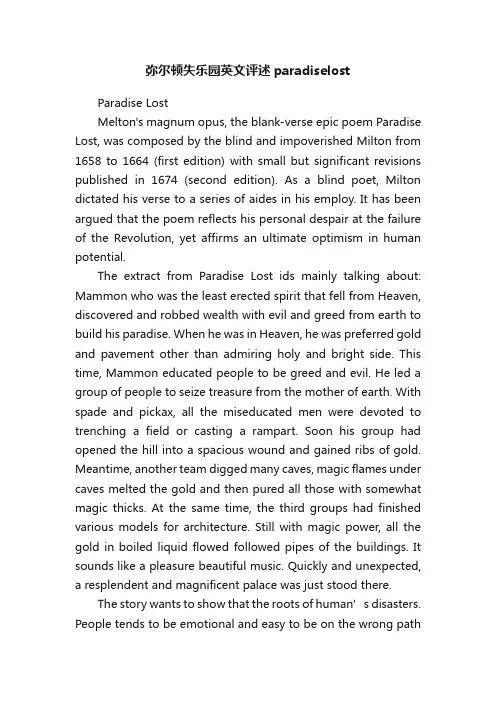
弥尔顿失乐园英文评述paradiselostParadise LostMelton's magnum opus, the blank-verse epic poem Paradise Lost, was composed by the blind and impoverished Milton from 1658 to 1664 (first edition) with small but significant revisions published in 1674 (second edition). As a blind poet, Milton dictated his verse to a series of aides in his employ. It has been argued that the poem reflects his personal despair at the failure of the Revolution, yet affirms an ultimate optimism in human potential.The extract from Paradise Lost ids mainly talking about: Mammon who was the least erected spirit that fell from Heaven, discovered and robbed wealth with evil and greed from earth to build his paradise. When he was in Heaven, he was preferred gold and pavement other than admiring holy and bright side. This time, Mammon educated people to be greed and evil. He led a group of people to seize treasure from the mother of earth. With spade and pickax, all the miseducated men were devoted to trenching a field or casting a rampart. Soon his group had opened the hill into a spacious wound and gained ribs of gold. Meantime, another team digged many caves, magic flames under caves melted the gold and then pured all those with somewhat magic thicks. At the same time, the third groups had finished various models for architecture. Still with magic power, all the gold in boiled liquid flowed followed pipes of the buildings. It sounds like a pleasure beautiful music. Quickly and unexpected, a resplendent and magnificent palace was just stood there.The story wants to show that the roots of human’s disasters. People tends to be emotional and easy to be on the wrong pathdue to lack of rational, strong will. That’s why people would always break regulations when influenced by various factors from the outside of the world. So is paradise lost. The author criticised those attitude and ill-mind. He affirmed people’s gumption, negated infinite hedonism. And also he affirmed people’s sens e of pride, negated the breeding pride and ambition. Just like the least erected spirit Mammon, he was too evil and greedy, and mislead the delicate human to be the same ones. They destroyed the earth, plundered the wealth resources of earth. All these com from their easily broken will. People there build up the resplendent and magnificent palace, hoping eternally lived in easy and comfortable without worries and danger.In the extract of Paradise Lost, Milton shows excellent means of artistic expression. Dazzling and lyric figure of speech. Such as veins of liquid fire, as in an organ from one blast of wind, rose like an exholatior, or build like a temple. He also use the manner in which Latin is used in speaking or writing. Furthermore,he used canorous tone which expressed the sweet of tonality. For example, too many arow of pipes the sound-board breathes anon out of the earth a fabric huge of dulcet symphonies and voices sweet. There is also a part of argument by Milton in the extract, let none admire that riches grow in hell. That soil may bestdeserve the precious bane. And here let those who boast in mortal things, and wondering tell of Babel, and the works of Memphian kings. Learn how their greatest monuments of fame, and strength, and art, are easily out-done by spirits reprobate, and in an hour what in an age they with incessant toil and hands innumerable scarce perform.Features of Milton’s works.(1) Milton is one of the very few truly great English writers who is also a prominent figure in politics, and who is both a great poet and an important prose writer. The two most essential things to be remembered about him are his Puritanism and his republicanism.(2) Milton wrote many different types of poetry. He is especially a great master of blank verse. He learned much from Shakespeare and first used blank verse in non-dramatic works.(3) Milton is a great stylist. He is famous for his grand style noted for its dignity and polish, which is the result of his life-long classical and biblical study.(4) Milton has always been admired for his sublimit of thought and majesty of expression.。
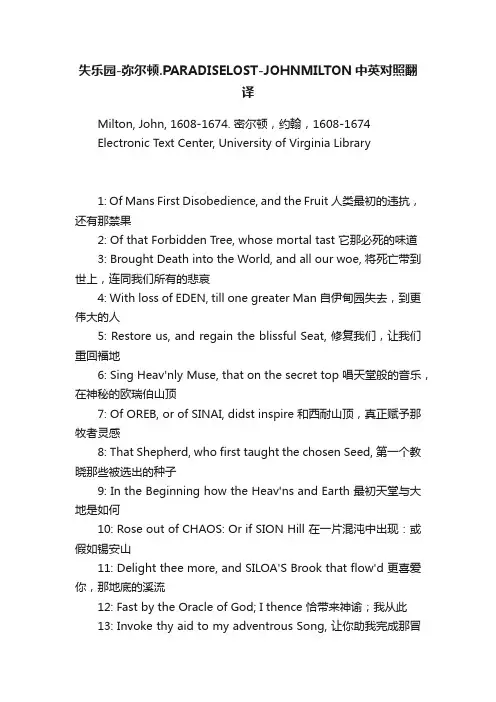
失乐园-弥尔顿.PARADISELOST-JOHNMILTON中英对照翻译Milton, John, 1608-1674. 密尔顿,约翰,1608-1674Electronic Text Center, University of Virginia Library1: Of Mans First Disobedience, and the Fruit 人类最初的违抗,还有那禁果2: Of that Forbidden Tree, whose mortal tast 它那必死的味道3: Brought Death into the World, and all our woe, 将死亡带到世上,连同我们所有的悲哀4: With loss of EDEN, till one greater Man 自伊甸园失去,到更伟大的人5: Restore us, and regain the blissful Seat, 修复我们,让我们重回福地6: Sing Heav'nly Muse, that on the secret top 唱天堂般的音乐,在神秘的欧瑞伯山顶7: Of OREB, or of SINAI, didst inspire 和西耐山顶,真正赋予那牧者灵感8: That Shepherd, who first taught the chosen Seed, 第一个教晓那些被选出的种子9: In the Beginning how the Heav'ns and Earth 最初天堂与大地是如何10: Rose out of CHAOS: Or if SION Hill 在一片混沌中出现:或假如锡安山11: Delight thee more, and SILOA'S Brook that flow'd 更喜爱你,那地底的溪流12: Fast by the Oracle of God; I thence 恰带来神谕;我从此13: Invoke thy aid to my adventrous Song, 让你助我完成那冒险之歌14: That with no middle flight intends to soar 平庸者所不敢飞越的高度15: Above th' AONIAN Mount, while it pursues 翻越阿诺安山,追逐着16: Things unattempted yet in Prose or Rhime. 诗歌与散文里未曾尝试之事17: And chiefly Thou O Spirit, that dost prefer 你,灵魂做主,更爱18: Before all Temples th' upright heart and pure, 在所有庙宇之前,以正直纯粹之心19: Instruct me, for Thou know'st; Thou from the first 指引我,因你知道:你自最初20: Wast present, and with mighty wings outspread 即已在此,伸开有力的双翼21: Dove-like satst brooding on the vast Abyss 鸽子般安坐在巨大的深渊前沉思22: And mad'st it pregnant: What in me is dark 看穿我内心的黑暗23: Illumine, what is low raise and support; 照亮那卑微,唤起并支持着我24: That to the highth of this great Argument 直到这伟大的辩论25: I may assert th' Eternal Providence, 我可断言永恒的天意26: And justifie the wayes of God to men. 证明神对世人的方式27: Say first, for Heav'n hides nothing from thy view 预言,因天对人无所隐藏28: Nor the deep Tract of Hell, say first what cause地狱亦是如此,言明何因29: Mov'd our Grand Parents in that happy State, 令我们的祖先自那欢乐境界30: Favour'd of Heav'n so highly, to fall off 先得天宠,因违背其意31: From their Creator, and transgress his Will 从他们的创造者那里堕落32: For one restraint, Lords of the World besides? 世界的主宰们竟然失去耐性33: Who first seduc'd them to that fowl revolt? 引他们发动家禽般的反抗34: Th' infernal Serpent; he it was, whose guile 邪恶的魔鬼,他的诡计35: Stird up with Envy and Revenge, deceiv'd 因嫉妒和复仇而起,欺骗了36: The Mother of Mankinde, what time his Pride 人类的母亲,当他的自尊37: Had cast him out from Heav'n, with all his Host 将他自天堂抛弃,以他为首的38: Of Rebel Angels, by whose aid aspiring 叛逆天使,因他们的热情39: To set himself in Glory above his Peers, 赋予他高于同类的光荣40: He trusted to have equal'd the most High, 相信他具有与最高者同等的地位41: If he oppos'd; and with ambitious aim 他野心勃勃42: Against the Throne and Monarchy of God 反抗神的王座和权力43: Rais'd impious War in Heav'n and Battel proud 徒然在天堂骄傲的发起不敬的战争44: With vain attempt. Him the Almighty Power 全能的力量45: Hurld headlong flaming from th' Ethereal Skie 自天上投射熊熊烈火46: With hideous ruine and combustion down 可怕的毁灭和燃烧降临47: To bottomless perdition, there to dwell 无尽的毁灭,若无休止48: In Adamantine Chains and penal Fire, 坚硬的锁链和惩罚之火49: Who durst defie th' Omnipotent to Arms. 加于敢对全能之神挑战者50: Nine times the Space that measures Day and Night 九倍于凡人以日夜计算的时间51: To mortal men, he with his horrid crew 他和他可怕的队伍52: Lay vanquisht, rowling in the fiery Gulfe 被击溃,倒在烈火的深渊53: Confounded though immortal: But his doom 虽不死却充满困惑:但他的厄运54: Reserv'd him to more wrath; for now the thought 使他更加愤怒;想起55: Both of lost happiness and lasting pain 失去的快乐和永恒的痛苦折磨56: Torments him; round he throws his baleful eyes 他以邪恶的眼神望向四周57: That witness'd huge affliction and dismay 只看到巨大的痛苦和沮丧58: Mixt with obdurate pride and stedfast hate:混合着冷酷的骄傲和笃实的憎恨59: At once as far as Angels kenn he views 旋以天使之眼看到60: The dismal Situation waste and wilde, 荒芜凄惨的境遇61: A Dungeon horrible, on all sides round 四周皆是恐怖的地牢62: As one great Furnace flam'd, yet from those flames 如巨大的洪炉,那火焰之中63: No light, but rather darkness visible 没有光,只有看的见的黑暗64: Serv'd only to discover sights of woe, 只为让你看见悲哀的景象65: Regions of sorrow, doleful shades, where peace 悲痛的领域,阴沉的影子,66: And rest can never dwell, hope never comes 永无和平与休息,人人都有的希望在这里67: That comes to all; but torture without end 永不来临,只有无穷的折磨68: Still urges, and a fiery Deluge, fed 仍在以燃烧不尽的硫磺,69: With ever-burning Sulphur unconsum'd: 持续那烈火的狂潮70: Such place Eternal Justice had prepar'd 这样的地方是永恒的正义71: For those rebellious, here their Prison ordain'd 为反叛者所准备,这里注定是他们的监狱72: In utter darkness, and their portion set 在绝对的黑暗中,他们的身体73: As far remov'd from God and light of Heav'n 被置于离神和天堂的光明玄远之地74: As from the Center thrice to th' utmost Pole. 三倍于天堂的中心到最远支柱的距离75: O how unlike the place from whence they fell! 与他们坠落的地方多么的不同76: There the companions of his fall, o'rewhelm'd 那和他一起坠落的,是无法抗拒的77: With Floods and Whirlwinds of tempestuous fire, 有如洪水旋风般的狂暴的火焰78: He soon discerns, and weltring by his side 他很快辨认出,在他之旁79: One next himself in power, and next in crime, 和他一样具有权力和罪行的80: Long after known in PALESTINE, and nam'd 那以后很久才在巴勒斯坦被名以81: BEELZEBUB. To whom th' Arch-Enemy, 别卜西以及他们头号敌人的82: And thence in Heav'n call'd Satan, with bold words 当时在天堂被称作撒旦的,83: Breaking the horrid silence thus began. 以大胆言辞打破恐怖的沉默的魔王。

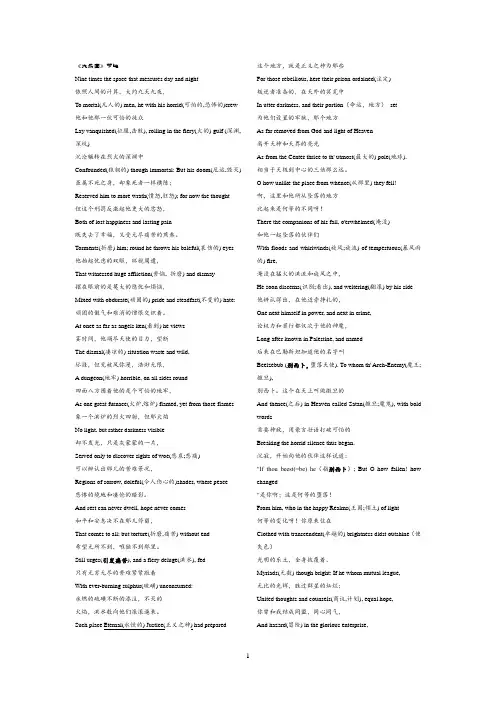
《失乐园》节选Nine times the space that measures day and night依照人间的计算,大约九天九夜,To mortal(凡人的) men, he with his horrid(可怕的,恐怖的)crew 他和他那一伙可怕的徒众Lay vanquished(征服,击败), rolling in the fiery(火的) gulf (深渊,深坑)沉沦辗转在烈火的深渊中Confounded(狼狈的) though immortal: But his doom(厄运,毁灭) 虽属不死之身,却象死者一样横陈;Reserved him to more wrath(愤怒,狂怒); for now the thought但这个刑罚反激起他更大的忿怒,Both of lost happiness and lasting pain既失去了幸福,又受无尽痛苦的煎熬。
Torments(折磨) him; round he throws his baleful(哀伤的) eyes他抬起忧虑的双眼,环视周遭,That witnessed huge affliction(苦恼, 折磨) and dismay摆在眼前的是莫大的隐忧和烦恼,Mixed with obdurate(顽固的) pride and steadfast(不变的) hate: 顽固的傲气和难消的憎恨交织着。
At once as far as angels ken(看到) he views霎时间,他竭尽天使的目力,望断The dismal(凄凉的) situation waste and wild,际涯,但见被风弥漫,浩渺无限,A dungeon(地牢) horrible, on all sides round四面八方围着他的是个可怕的地牢,As one great furnace(火炉,熔炉) flamed, yet from those flames象一个洪炉的烈火四射,但那火焰No light, but rather darkness visible却不发光,只是灰蒙蒙的一片,Served only to discover sights of woe(悲哀;悲痛)可以辨认出那儿的苦难景况,Regions of sorrow, doleful(令人伤心的)shades, where peace悲惨的境地和凄怆的暗影。
ParadiseParadiseParadiseParadiseLostLostLostLost失乐园JohnJohnJohnJohnMiltonMiltonMiltonMilton约翰约翰约翰约翰····弥尔顿弥尔顿弥尔顿弥尔顿目录V1V1V1V1第一卷撒旦在地狱召集军队号召复仇点兵第二卷大会作出决议由撒旦亲赴人类乐园侦察人类的乐园第三卷神子声称愿为人类赎罪撒旦向乐园飞进第四卷撒旦进入乐园被捕第五卷敌人撒旦的来路第六卷在天界三天大战第七卷创造天地万物第八卷创造人类始祖第九卷夏娃受引诱食禁果第十卷违抗禁令震惊天界建筑大桥横贯混沌界第十一卷预示人类未来第十二卷继续预示未来亚薄⑾耐薇恢鸪隼衷癟HETHETHETHEARGUMENTARGUMENTARGUMENTARGUMENT提纲ThisfirstBookproposesfirstinbriefthewholeSubjectMansdisobedienceandthelossthereupon ofParadisewhereinhewasplact:ThentouchestheprimecauseofhisfalltheSerpentorratherSata nintheSerpentwhorevoltingfromGodanddrawingtohissidemanyLegionsofAngelswasbythe commandofGoddrivenoutofHeavenwithallhisCrewintothegreatDeep.Whichactionpastover thePoemhastsintothemidstofthingspresentingSatanwithhisAngelsnowfallenintoHelldescri bdherenotintheCenterforHeavenandEarthmaybesupposdasyetnotmadecertainlynotyetaccu rstbutinaplaceofutterdarknessfitliestcalldChaos:HereSatanwithhisAngelslyingontheburnin gLakethunder-struckandastonishtafteracertainspacerecoversasfromconfusioncallsuphimw honextinOrderandDignitylaybyhimtheyconferofthirmiserablefall.SatanawakensallhisLegi onswholaytilltheninthesamemannerconfoundedTheyrisethirNumbersarrayofBattelthirchie fLeadersnamdaccordingtotheIdolsknownafterwardsinCanaanandtheCountriesadjoyning.T otheseSatandirectshisSpeechcomfortsthemwithhopeyetofregainingHeavenbuttellsthemlast lyofanewWorldandnewkindofCreaturetobecreatedaccordingtoanancientProphesieorreport inHeavenforthatAngelswerelongbeforethisvisibleCreationwastheopinionofmanyancientFa thers.TofindoutthetruthofthisProphesieandwhattodeterminthereonhereferstoafullCouncel. WhathisAssociatesthenceattempt.PandemoniumthePalaceofSatanrisessuddenlybuiltoutoft heDeep:TheinfernalPeerstheresitinCouncel.V1在第一卷我先扼要点明本书的主题人失去曾经拥有的乐园是由于违背了天神命令。
失乐园读后感英文Paradise Lost is a classic epic poem written by John Milton in the 17th century. The poem is a retelling of the biblical story of the fall of man, focusing on therebellion of Satan and the subsequent expulsion of Adam and Eve from the Garden of Eden. It is a powerful and thought-provoking work that delves into themes of free will, temptation, and the nature of good and evil.One of the most striking aspects of Paradise Lost isits portrayal of Satan as a complex and multifaceted character. Milton's Satan is not simply a one-dimensional villain, but a charismatic and tragic figure who is capable of both great evil and profound insight. His rebellion against God is portrayed as a desperate and ultimatelyfutile attempt to assert his own independence and autonomy. Despite his defiance, Satan is ultimately unable to escape the consequences of his actions, and his pride and arrogance lead to his downfall.The character of Satan raises important questions about the nature of free will and the existence of evil in the world. Milton's portrayal of Satan as a figure who chooses to rebel against God challenges the traditional Christian understanding of evil as a force imposed on humanity from outside. Instead, Paradise Lost suggests that evil is the result of human choice and the consequences of our own actions. This raises profound questions about the nature of moral responsibility and the ways in which we can resist temptation and choose the path of righteousness.In addition to its exploration of the nature of evil, Paradise Lost also delves into the complexities of human relationships and the consequences of our actions. The fall of Adam and Eve from grace is a tragic and deeply moving moment in the poem, as they are forced to confront the consequences of their disobedience. Their expulsion from the Garden of Eden is a powerful metaphor for the loss of innocence and the challenges of living in a fallen world. However, Milton also suggests that there is hope for redemption, and that through repentance and faith, it is possible for humanity to find its way back to God.Overall, Paradise Lost is a deeply thought-provoking and powerful work that continues to resonate with readers today. Its exploration of the nature of evil, the complexities of human relationships, and the possibility of redemption make it a timeless and enduring classic. The character of Satan, in particular, challenges us to confront the complexities of moral responsibility and the ways in which we can resist temptation and choose the path of righteousness. It is a work that raises profound questions about the nature of good and evil, and the waysin which we can find hope and redemption in a fallen world.。